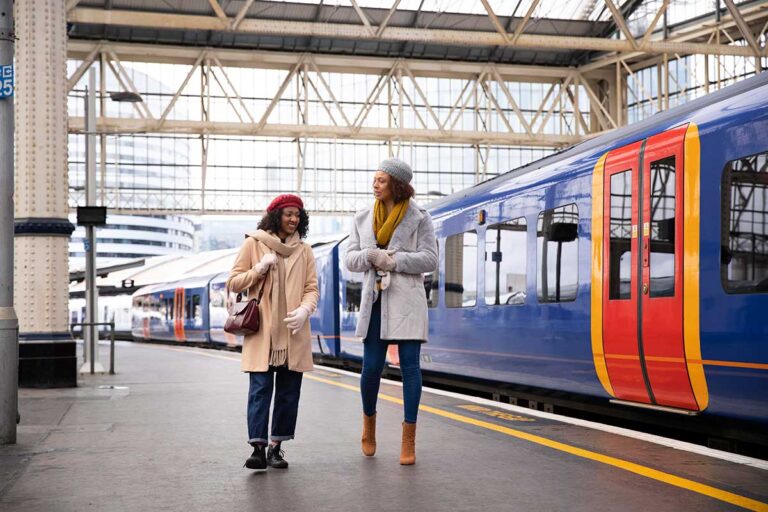The Impact of Passenger Train Injuries in Georgia — Common Causes and Legal Remedies
When you board a train, subway stop, or commuter rail service in Georgia, you rightly expect that the trip will be safe. Unfortunately, serious injuries can and do occur on trains, at stations, and at crossings. For victims and their families, these incidents can bring life‑altering consequences—physical, emotional, and financial. Whether you were a passenger on the train, a pedestrian near the tracks, or a motorist involved in a collision at a railway crossing, knowing your rights and legal options is critical. Attorney Jordan Jewkes and our dedicated team are here to help Georgia victims recover the compensation they deserve. This article outlines key issues related to passenger train injuries in Georgia—including the scope of the problem, common causes, legal rights, and how our firm can help.
Overview of Passenger Train Accidents in Georgia
Passenger trains play a vital role in Georgia’s transportation network, serving thousands of commuters and travelers daily. Although generally safe, accidents and injuries do occur due to:
- Collisions at railroad crossings
- Derailments
- Negligence in train operations
- Defective equipment or maintenance failure
- Passenger slip and fall incidents on moving trains
While train accidents are less common than car accidents, their consequences are often severe because of the train’s massive size and momentum. Injuries resulting from passenger train accidents can range from minor bruises to catastrophic injuries or wrongful death.
Scope and Context in Georgia
- According to national data compiled by (FRA), there were 2,261 highway‑rail grade crossing collisions in the U.S. in 2024, with 763 reported injuries.
- For the state of Georgia alone in 2024, there were 107 crossing collisions, four deaths and 35 injuries reported.
- Data specific to passenger‑on‑train injuries in Georgia are more limited, but the available figures reflect that passengers do sustain injuries in train incidents. For example, in one dataset: in year 2000, for Georgia, there were 4 passenger injuries aboard trains (and zero passenger fatalities) reported.
- A report noted that between 2013 and 2022, Georgia recorded 545 train accidents.
Why the Numbers Matter
While the raw numbers may seem modest for passenger‐on‐train injury, what matters is the severity of those injuries and the complexity of establishing liability. Even a single multifaceted incident—for example a derailment, collision, or platform incident—can result in catastrophic injuries. Train injury cases differ from typical car accidents claims. They often involve common carriers, federal regulation, multiple defendants, and significant damages.
Injured on a Passenger Train? Contact Us For A Free Consultation
Injured on a Passenger Train?

Common Causes of Passenger Train Injuries in Georgia
Understanding how these injuries happen is the first step toward prevention and toward building a strong claim. Below are the common causation categories relevant in Georgia.
Platform or station incidents
A passenger may slip, trip or fall at a station, platform, boarding area, or escalator. For example, inadequate lighting, wet surfaces, lack of handrails or neglected maintenance can be contributing factors. In Georgia, law‑firms report injuries to waiting commuters or people boarding/disembarking trains or metro systems (such as —MARTA).
Collisions and derailments
The train may collide with another train, vehicle, or object, or suffer a derailment. Even if the crash does not kill the passenger, serious physical trauma (brain injury, spinal injury, burns) can result. For example, an article notes that when trains derail or collide, passengers can suffer catastrophic injuries such as brain damage or life‑threatening burns.
Experts often cite mechanical failure, human error, signal or communication failure as causes. For example, a Georgia firm notes “Human error, missing signage, mechanical issues” as leading causes of local train accidents.
Grade‐crossing and trespasser incidents
While a grade crossing incident often involves a vehicle, passengers aboard the train may still suffer injuries if the train collides at a crossing or the derailment occurs due to defective crossing infrastructure.
Trespassers or unauthorized persons on railroad property may lead to incidents that impact the train or passengers. A Georgia‐specific CDC study found that between 1990‑96, injuries to trespassers on railroad tracks were significant.
Maintenance or infrastructure failure
If the train operator does not maintain the tracks, switches, signals or other infrastructure properly, they may be liable. For instance, officials cited poor grading of crossings leading to visibility issues in Georgia.
Also, station or platform maintenance lapses (slippery platforms, missing warnings) can lead to injuries even without a collision.
Need a Free Consultation? Need a Skilled Attorney?
Free Consultation
Call (770) 771-5130
If you’ve been injured, you need to hire the best legal care to assist you with your claim. Get a FREE consultation today!
Common Types of Injuries Sustained in Train Accidents
Passengers involved in train accidents in Georgia may suffer from:
- Traumatic brain injuries (TBI)
- Spinal cord injuries, including paralysis
- Broken bones and fractures
- Internal injuries and organ damage
- Lacerations and soft tissue injuries
- Psychological trauma such as PTSD
The sudden impact or derailment can also cause secondary injuries, including being thrown inside the train car or crushed by falling objects.
Causes and Liability in Passenger Train Injury Cases
Identifying who is at fault in a Georgia train injury case is often complex. Potential responsible parties include:
- Train companies and operators
- Railroad crossing owners or maintenance companies
- Manufacturers of defective train components
- Local government agencies responsible for track maintenance and safety
- Negligent employees such as train conductors or engineers
Common causes of passenger train injuries include operator negligence, failure to observe crossing signals, speeding, poor track conditions, and inadequate safety warnings.
Georgia Laws Governing Train Accident Claims
Georgia follows general personal injury principles, but train accident claims may involve additional federal and state regulations:
- Federal Railroad Safety Act (FRSA): Regulates railroad safety standards
- Federal Employer Liability Act (FELA): Applies to railroad employee injuries
- Georgia Statutes of Limitations: Typically, you have 2 years from the date of injury to file a lawsuit
Because railroad companies often have substantial legal resources and insurance, working with an experienced attorney like Jordan Jewkes is essential to navigate both state and federal laws and protect your rights.
Legal Issues and Victims’ Rights in Georgia
Because train injury cases in Georgia involve unique legal issues, it is important to recognize your rights and the legal framework that governs them. Here are the key elements.
Duty of Care and Standard of Liability
Trains and rail operators generally owe a high duty of care, especially where they act as common carriers. For passengers, this means the operator must take “extraordinary care” to ensure the journey is safe. Federal bodies (such as the FRA) regulate railroads and transit authorities and require them to comply with safety standards. Failure to do so can support a claim of negligence. Victims must demonstrate:
- the operator or responsible entity owed a duty
- the operator or responsible entity breached that duty (for example via faulty equipment, missing signal, improper maintenance)
- the breach caused the injury
- damages resulted
Statute of Limitations and Important Deadlines
In Georgia, the time limit to file a personal injury claim (including from a train accident) is typically two years from the date of the injury (see O.C.G.A. § 9‑3‑33).
Waiting too long may bar your right to compensation. You may lose evidence (video, maintenance records, crew logs) over time—so prompt legal action is essential.
Comparative Fault and Compensation
Georgia follows a comparative fault system: if you are partially at fault for the accident, the court may reduce your recovery according to your percentage of fault (so long as you are less than 50% at fault). Damages available may include: medical bills, rehabilitation, lost wages, future earning capacity, pain and suffering, emotional distress, and in some cases punitive damages (if the conduct was particularly reckless).
Common Defendants and Liability Sources
Possible responsible parties include the rail operator (e.g., freight, commuter, or passenger train company), the transit agency (e.g., MARTA), station or platform owners/operators, equipment manufacturers, contractors who maintained tracks or signals, and municipalities (in some cases).
Because rail systems are federally regulated and often involve multiple entities (operator + infrastructure owner + maintenance provider), these cases tend to be complex—so you’ll ideally want a law firm experienced in railroad litigation.

Why Victims Should Contact The Jewkes Firm
Attorney Jordan Jewkes and the staff at The Jewkes Firm have years of experience handling complex passenger train injury claims throughout Georgia. We provide compassionate, personalized legal support including:
- Dedicated focus. We understand the unique nature of rail cases in Georgia—including federal regulator frameworks, track/signal issues, platform hazards, and the special duty of care owed by rail carriers.
- Aggressive advocacy. We will investigate every potential source of liability—operator, maintenance contractor, platform owner, equipment manufacturer—to ensure no stone is left unturned.
- Client‑first approach. We operate on a contingency fee basis. We get paid if you win your case. We stand by you from initial consultation through negotiation or trial if needed.
- Resources for complex cases. Rail injury matters often require expert testimony (signal/switch analysis, maintenance history, human factors). We partner with experts to strengthen your case.
- Timely action. Given the two‐year deadline in Georgia, we act quickly to preserve evidence such as train data logs, surveillance video, maintenance records and witness statements.
We understand the physical, emotional, and financial burdens that follow a train injury, and we fight tirelessly to secure your rights. If you or a loved one has been injured while riding a train, waiting for a train, at a station, or in any rail‐related incident in Georgia—call us at (770) 771-5130 for a free consultation and let us help you understand your rights.
Checklist for Injured Train Passengers in Georgia
Here are steps to take (and items to keep in mind) if you or someone you know has been injured:
- Seek medical attention immediately. Document your injuries and care.
- Report the incident to the rail operator and/or station authority. Request a copy of the incident report.
- Preserve evidence – keep your ticket/wristband, take photos of the scene (platform, train car, station), obtain names of witnesses.
- Keep all bills and records – medical bills, prescriptions, rehabilitation, lost work wages, how the injury has impacted your life.
- Avoid speaking to insurers or rail company lawyers without your attorney present.
- Contact a qualified rail‑injury attorney promptly – because months matter, evidence can disappear, and deadlines are tight.
- Be aware of time limits. You typically have two years in Georgia to pursue a personal injury claim arising from a train incident.
- Understand that you may be partially at fault. Georgia’s comparative fault law allows you to recover even if you bear some fault, but the other parties’ share must be greater.
- Don’t wait on settlement offers. Rail carriers and their insurers may attempt a quick, low‑ball offer. It’s wise to have legal counsel review any offer before accepting.
- Plan for the long term. Train injuries can lead to long‑term or life‑long consequences (lost earnings, ongoing care). Your claim should reflect future losses as well as immediate harm.

GEORGIA PERSONAL INJURY LAWYER NEAR ME
Contact The Jewkes Firm for a Free Consultation
Passenger train injuries in Georgia may not occur daily in the public consciousness—but when they do, the consequences can be profound. Whether the incident arises from a collision, derailment, platform slip and fall, or other rail‐related hazard, victims deserve full accountability. At The Jewkes Firm, we understand the complex legal terrain of rail‑injury claims in Georgia. If you or a loved one has been injured in a train or rail‑related incident in Georgia, don’t navigate this alone. Contact The Jewkes Firm, and Attorney Jordan Jewkes will personally review your case, explain your legal rights, and guide you forward with care and experience.
Your fight is our fight — let us put our experience to work for you.
Frequently Asked Questions
What should I do immediately after being injured on a passenger train in Georgia?
Seek medical attention right away, report the incident to train officials and law enforcement, preserve evidence, and contact an experienced personal injury attorney like Attorney Jordan Jewkes.
How long do I have to file a passenger train injury claim in Georgia?
Generally, the statute of limitations is two years from the date of the injury, but this can vary depending on case specifics and applicable federal laws.
Who can be held liable in a passenger train accident?
Liability may fall on the train operator, railroad company, equipment manufacturers, or government entities responsible for track maintenance, depending on the circumstances.
What types of compensation can I recover for a train injury?
Compensation may include medical expenses, lost wages, pain and suffering, emotional distress, and in wrongful death cases, damages for survivors. The amount will depend on the severity of your injuries, the circumstances of the incident, and who is found liable.
What types of injuries are common in passenger train accidents?
Common injuries from passenger train accidents include broken bones, head and spinal injuries, burns, cuts, and psychological trauma. Serious accidents, such as collisions or derailments, can result in catastrophic injuries like brain damage or paralysis.





